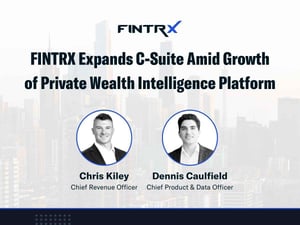START YOUR FREE TRIAL
GET STARTED
The Industry’s Most Trusted Private Wealth Data—Comprehensive, Accurate, and Current
Explore the leading platform used by asset managers to find and engage with RIAs, Broker-Dealers, Family Offices, Foundations & Endowments. Request your free trial of FINTRX now and see for yourself.
Blog & Resources
NEWS AND INSIGHTS FROM FINTRX
The Definitive Guide to Family Offices
The family office market has evolved into one of the most influential and complex segments of the global wealth ecosystem. Every family office is unique in structure, services, and investment focus, but they all share one common goal: to preserve and grow wealth across generations. As these private entities expand in size, scope, and sophistication, understanding their history, structure, and investment behavior has never been more important.
What is a Family Office?
A family office is a private wealth management organization established to oversee the financial and personal affairs of an individual or family. Services typically include investment management, tax and estate planning, philanthropy, insurance, trust administration, and more. No two family offices are identical. Each reflects the priorities, personalities, and objectives of its founding family, making the space both dynamic and difficult to define.
Over the past two decades, family offices have rapidly modernized, adopting institutional-grade investment practices while maintaining the agility and privacy that make them so attractive to entrepreneurs, asset managers, and fundraisers alike.
Institutions vs. Family Offices: Key Differences
Unlike traditional institutional investors, such as banks, pensions, or insurance companies, family offices are nimble, opportunistic, and unconstrained by rigid mandates. Institutional investors typically operate under lengthy due diligence timelines and strict benchmarks. Family offices, on the other hand, can make decisions quickly, hold investments longer, and pursue opportunities aligned with personal passions or legacy goals. This flexibility makes family offices an increasingly important source of private capital for funds, startups, and direct investment opportunities.
Single-Family Offices vs Multi-Family Offices
Single-Family Offices (SFOs)
→ Serve one family exclusively
→ Handle all financial, administrative, and lifestyle needs, from investments and tax planning to real estate, insurance, and philanthropy
→ Typically established once family wealth exceeds $50 million (though most manage far more)
Multi-Family Offices (MFOs)
→ Serve multiple unrelated families under one platform
→ Offer a turnkey suite of services, allowing new clients to plug into established infrastructure
→ Many began as single-family offices and evolved to serve other wealthy families
A Brief History of Family Offices
The concept of family wealth management dates back to royal stewards managing estates in the 6th century. Modern family offices took shape in the 19th century, most notably with J.P. Morgan’s House of Morgan (1838) and the Rockefeller Family Office (1882). The Rockefeller office became the blueprint for modern family offices, combining investment oversight with philanthropy, trust management, and long-term wealth preservation. Today, the model has proliferated worldwide, reshaping how high-net-worth families manage capital and contribute to the broader private markets.
The Modern Family Office: A New Investment Mindset
Today’s family offices are far more entrepreneurial and transparent than in decades past. They’re no longer solely focused on preserving wealth; they’re deploying it strategically, often as direct investors or co-investors alongside venture capital and private equity firms. Emerging sectors like AI, biotech, clean energy, and blockchain have become frequent targets for modern family offices, which value both innovation and control.
Finding Common Ground: Data-Driven Relationship Building
Technology and data have redefined how professionals engage with family offices. Platforms like FINTRX make it possible to identify shared affinities, such as alma maters, philanthropic interests, or industry experience, that lead to more meaningful conversations. With tools like FINTRX Affinity, users gain access to actionable insights across 10,900+ family office decision-makers, including shared connections, warm introductions, and personalized conversation starters, helping turn cold outreach into genuine relationships.
The Role of Origin of Wealth
Family offices tend to invest in industries tied to their source of wealth. A family that built its fortune in technology, for example, is more likely to back SaaS or cybersecurity companies. Understanding this connection can dramatically improve your targeting strategy and increase your success rate when seeking investment or partnership.
Investment Trends: Direct Investing on the Rise
Family offices are increasingly bypassing traditional fund structures to invest directly in private companies. The motivations are clear:
→ Greater control and transparency
→ Reduced management fees
→ Longer investment horizons
More than half of global family offices now engage in some form of direct investing, a trend that continues to accelerate as these entities build internal investment teams and sector expertise. With FINTRX, financial professionals can analyze where family office and RIA/BD capital is flowing, track deal activity, and identify co-investment patterns across private markets.
Global Growth & Expansion

Once concentrated in the United States, family offices are now a global phenomenon.
-
→ Asia has seen the fastest growth, driven by generational wealth transfers and entrepreneurial success stories.
→ Europe and the Middle East continue to see rapid expansion, particularly among energy and industrial families.
→ Across all regions, technology and succession planning are accelerating family office formation.
Family Office Assets Under Management
Assets under management (AUM) represent the total value of all assets overseen by a family office. For single-family offices, this applies to one family’s holdings, while multi-family offices manage capital for several unrelated families or individuals. There’s no universally defined minimum AUM threshold to qualify as a family office; it varies widely based on structure and strategy.
At FINTRX, we use a baseline of $50 million, though the majority of family offices tracked on our platform manage over $100 million in assets. Understanding AUM size is key to gauging an office’s capacity, sophistication, and potential fit for partnership or investment.
ESG & Impact Investing
Family offices are increasingly prioritizing ESG (Environmental, Social, and Governance) and impact investing strategies. According to the MSCI ESG Leaders Index, impact investments have outperformed benchmarks in eight of the past ten years. Family offices are drawn to these opportunities because they align purpose with profit, driving positive social or environmental outcomes while delivering financial returns.
FINTRX tracks hundreds of family offices with active ESG and impact mandates, providing visibility into their investment patterns and preferred sectors.
Conclusion: The Family Office Evolution Continues
The family office ecosystem is more sophisticated—and influential—than ever before. These entities represent one of the most dynamic sources of private capital globally, and their appetite for innovation continues to grow. For asset managers, advisors, and fundraisers, success depends on understanding who these investors are, how they operate, and where they’re deploying capital. At FINTRX, we make that possible. Our AI-powered platform delivers a complete view of the private wealth landscape, covering 4,300+ family offices, 27,000+ decision-makers, and the relationships that drive investment activity.
Ready to uncover the family offices shaping global private wealth? Request a FINTRX demo to see how our platform empowers you to discover, connect, and build relationships with the investors that matter most.
Similar Content
COMPANY
COMPARE US

Copyright © 2025 FINTRX, Inc. All Rights Reserved. 18 Shipyard Drive Suite 2C Hingham, MA 02043 Data Privacy Policy
.png?width=367&height=109&name=ezgif.com-gif-maker%20(3).png)


